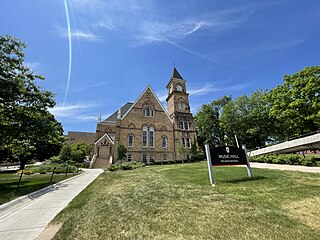Related Research Articles

Home economics, also called domestic science or family and consumer sciences, is a subject concerning human development, personal and family finances, consumer issues, housing and interior design, nutrition and food preparation, as well as textiles and apparel. Much less common today, it was, and is, most commonly taught in secondary school or high school.

The University of Wisconsin–Stout is a public university in Menomonie, Wisconsin. A member of the University of Wisconsin System, it enrolls more than 9,600 students. The school was founded in 1891 and named in honor of its founder, lumber magnate James Huff Stout.

The New York State College of Human Ecologyat Cornell University (HumEc) is a statutory college and one of four New York State contract colleges located on the Cornell University campus in Ithaca, New York. The College of Human Ecology is compilation of study areas such as design, design thinking, consumer science, nutrition, health economics, public policy, human development and textiles, each through the perspective of human ecology.
The College of Agricultural and Environmental Sciences (Ag&E) is one of four colleges of the University of California, Davis. Established in 1922, it offers degrees in 27 undergraduate majors and thirty-three graduate groups. As of January 2014, the College has been overseen by Dean Helene Dillard.

Fort Valley State University is a public land-grant historically black university in Fort Valley, Georgia. It is part of the University System of Georgia and a member-school of the Thurgood Marshall College Fund.

The University of Wisconsin–Stevens Point is a public university in Stevens Point, Wisconsin. Established in 1894, it is part of the University of Wisconsin System. UW-Stevens Point grants associate, baccalaureate, and master's degrees, as well as doctoral degrees in audiology and educational sustainability. As of 2018, UW-Stevens Point has merged with UW-Stevens Point at Wausau and UW-Stevens Point at Marshfield. The 406-acre (164 ha) main campus includes the 280-acre (113 ha) Schmeeckle Reserve on the north side of the Campus. There are 15 academic buildings, and 13 Residence Halls.
The University of Georgia College of Family and Consumer Sciences (FACS) is a college within the University of Georgia (UGA) in Athens, Georgia, United States.

The University of Georgia School of Social Work (SSW) is a college within the University of Georgia (UGA) in Athens, Georgia, United States.

The College of Natural Sciences at The University of Texas at Austin offers 10 Bachelor of Arts majors, 42 Bachelor of Science majors, and 20 graduate programs to more than 11,000 undergraduates and 1,400 graduate students. The college employs over 370 faculty. Many of the programs are consistently ranked in the top ten nationally, according to U.S. News & World Report (2019), including: Analytical Chemistry (4th), Applied Math (9th), Artificial Intelligence (8th), Computer Science (10th), Computing Systems (8th), Computing Theory (7th), Cosmology/Relativity/Gravity (10th), Ecology, Evolution and Behavior (6th), Mathematics Analysis (7th), Plasma Physics (3rd), Programming Language (8th), and Topology (8th). It was established in 1883.

May Louise Cowles was an American economist, researcher, author, and advocate of Home Economics. She was a member of the faculty at the University of Wisconsin–Madison from 1915 to 1958. She had many submissions published in the Journal of Home Economics, the Journal of the American Dietetic Association, and Rural Sociology. She also produced several widely read pamphlets, including Meeting Housing Needs of Older People in Rural Areas (1957), and spoke at a string of national seminars to encourage the addition of family economics to home economics instruction across the United States.

IPB University is a state-run agricultural university based in the regency of Bogor, Indonesia.
The College of Business is the business school of James Madison University in Harrisonburg, Virginia. It is a fully accredited business school that offers undergraduate degrees in accounting, computer information systems, business analytics, economics, finance and business law, international business, management, marketing, and quantitative finance. Additionally, the College of Business offers two master of business administration programs – an Innovation MBA program and an Information Security MBA program. The college also offers a master of science in accounting. It has received recognitions and awards from multiple organizations, including being listed in BusinessWeek's Top 5% Undergraduate Programs and the 40th best business school in the United States. Its facilities are located in Zane Showker Hall on the southwestern part of JMU's campus.
The Robert M. La Follette School of Public Affairs, commonly known as the La Follette School, is a public graduate public policy school at the University of Wisconsin–Madison. It offers master's degrees in public affairs and international public affairs, and joint degrees with other departments. The La Follette School is housed in the Observatory Hill Office Building.

The School of Social Ecology (SSE) is a school at the University of California, Irvine (UCI) that focuses on social ecology. Students in SSE at UCI undergo a multidisciplinary program that examines real-world social and environmental issues and that involves the students in off-campus internships as well as on-campus courses. SSE offers undergraduate and graduate degrees, including bachelor's, professional master's, and Ph.D.s.


The University of Wisconsin–Madison College of Agricultural and Life Sciences is one of the colleges of the University of Wisconsin–Madison. Founded in 1889, the college has 17 academic departments, 23 undergraduate majors, and 49 graduate programs.

The University of Wisconsin–Madison is a public land-grant research university in Madison, Wisconsin. UW–Madison serves as the official state university of Wisconsin and the flagship campus of the University of Wisconsin System, while also earning recognition as a Public Ivy — a testament to its exceptional educational quality. Founded in 1848 when Wisconsin achieved statehood, UW-Madison was the first public university established in Wisconsin and remains the oldest and largest public university in the state. UW-Madison became a land-grant institution in 1866. The 933-acre (378 ha) main campus, located on the shores of Lake Mendota, includes four National Historic Landmarks. The university also owns and operates the 1,200-acre (486 ha) University of Wisconsin–Madison Arboretum, located 4 miles (6.4 km) south of the main campus, which is also a National Historic Landmark.
The University of Wisconsin–Madison College of Agricultural and Life Sciences offers the one- or two-year Farm and Industry Short Course (FISC) program to high school graduates interested in farming or one of Wisconsin’s many other agricultural industries. The program runs from November to April and has an average enrollment of 135 students.

The University of Wisconsin–Madison Mead Witter School of Music is a collegiate music school. It was known as the University of Wisconsin - Madison School of Music until 2016, when the Mead Witter Foundation contributed a $25 million gift to the University, which is being used to fund a planned new performance building. The institution consists of a 60-member faculty. The School of Music was established in the year of 1895. The music degree program was organized in 1915, emphasizing training for public school music teachers. In 1939 the School created the first musical artist-in-residence position at any American university. The School is housed within the George L. Mosse Humanities building.
The College of Arts and Sciences at Illinois State University provides major and minor programs at the undergraduate level. Some of these programs are interdisciplinary. Many departments have teacher education programs where a student majors in a subject discipline while getting credentials towards a teaching certificate.
References
- ↑ "Home". sohe.wisc.edu.
- ↑ Kenneth Casper, Undergraduate Majors , accessed March 2, 2009